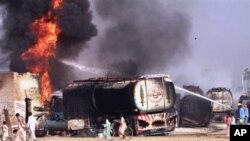As the U.S.-led war in Afghanistan picks up pace, the role of Pakistan in that effort, analysts say, is becoming both more necessary and more troublesome. The United States needs Pakistan to help carry out its Afghan strategy. Pakistan needs the U.S. for foreign assistance, particularly military aid.
In his new book, Obama's War, journalist Bob Woodward quotes President Obama as saying in a late 2009 meeting in his Oval Office that "We need to make clear to people that the cancer is in Pakistan." The "cancer" he refers to is the safe havens just inside Pakistan from which Taliban fighters launch attacks on NATO forces in Afghanistan. Yet, despite U.S. pleading and inducements to the Pakistani government, the Taliban strongholds remain by and large intact.
In what analysts say is a sign of growing frustration, the U.S. has sharply escalated its unmanned aerial drone attacks on the Taliban safe havens inside Pakistan. There have also been new instances of so-called "hot pursuit" in which NATO forces crossed briefly into Pakistani territory to attack fleeing Taliban fighters. In one recent incident, a NATO helicopter gunship killed three Pakistani soldiers while attacking the militants.
In retaliation, Islamabad closed a key western border crossing at the base of the Khyber Pass, bottling up convoys taking fuel and other supplies to NATO troops in Afghanistan. Many of the trucks waiting in Pakistan to make the journey, which have no U.S. troop protection, were attacked and burned by Taliban fighters.
"Though some of the U.S.-NATO military actions inside Pakistan can be justified legally as 'hot pursuit', the danger is the growing inflammation of Pakistani public opinion against the U.S.," says the former European Union Special Representative to Afghanistan, Francesc Vendrell. He also says there is a danger that the cross-border actions will trigger what he calls "increased sabotage of our efforts in Afghanistan by the ISI," Pakistan's powerful intelligence service.
Pakistan has repeatedly denied any role in backing the Taliban and says it is energetically working to fight terrorism. But some analysts say Pakistan is nevertheless positioning itself to be a major player when U.S. troops withdraw from Afghanistan. That process is supposed to begin next July if conditions on the ground permit.
Political stability in Afghanistan is also part of that equation, and recent parliamentary elections in Afghanistan were riddled with what U.S. Army War College Professor Larry Goodson calls "obvious and significant fraud." The government of Afghan President Hamid Karzai is also viewed as rife with corruption, Goodson says, noting that governmental legitimacy is critical to the U.S. strategy in Afghanistan.
"Fraudulent elections never do much to create legitimacy, and the other possible way of getting there, such as providing goods and services, seem equally problematic for the Afghan government," Goodson says. "So how, exactly, do we get the Afghan people to accept the legitimacy of a manifestly illegitimate government?"
In a study written for the National Bureau of Asian Research but never published, Goodson says, "the United States cannot easily extricate itself from Afghanistan in the near future. Not only will the United States lose its standing to other powers in the region, the state-building project necessary to create peace and stability will fail."
As a result, the United States may end being even more reliant on Pakistan. An analysis by the private intelligence firm, STRATFOR, concludes that "Pakistan's assistance will be needed in the not-too-distant phase of reaching a negotiated settlement with the Afghan Taliban, which would create the circumstances for Western forces to exit Afghanistan."
Pakistan's Role in Afghan War Questioned
- By Gary Thomas




